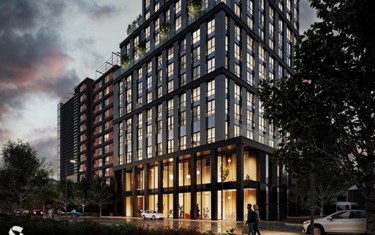Richard Blyth FRTPI is the RTPI’s Head of Policy, Practice and Research
 After a gap of 4 years, I returned to Poland to speak at the European Congress of Local Governments. This year it was held in the Mazurian Lake District in the far North East, which is a fascinating area – a kind of supercharged Norfolk Broads.
After a gap of 4 years, I returned to Poland to speak at the European Congress of Local Governments. This year it was held in the Mazurian Lake District in the far North East, which is a fascinating area – a kind of supercharged Norfolk Broads.
Naturally this year the Congress was very strongly influenced by Ukraine. Even last time I noted just how many delegates came from Ukraine. This year the mood was solemn, but triumphant. We heard from four mayors just how difficult the last year has been for them and how much peer-to-peer support from cities across Europe has been critical in mobilising rapid support for reconstruction. I was amazed how much the liberated city of Bucha has been rebuilt already with help from twin cities in Germany, Italy, and Portugal. On the other hand one mayor’s city was still occupied. It was interesting that the help most strongly asked for was for diggers, pumps, buses, and tractors: “second-hand welcome”. This is the very kind of thing a city elsewhere in Europe might easily be able to supply.
These congresses are used to present annual awards to local government. This year, not surprisingly, there was a special award to the city which helped Ukraine the most. This went to Przemyśl, the city on the front line. Awards in Poland are taken very seriously and involve a fully orchestral accompaniment.

The awards ceremony
In my last visit I noted how tensions between central and local government were clearly present - and this has continued. Ministers at the Congress were asked “when will the Government compensate local government for the loss of income brought about by the decision to lower national taxes?”. What strikes me as fascinating about this question is that it was asked at all. In England we seem to regard it as somehow natural that local government should have borne the brunt of national austerity since 2010. But with an outside perspective you can see it makes perfect sense: if national government wants lower taxes, it should shoulder the responsibility for that from its own spending. What would be familiar to readers here is the long running battle between Poland and the EU on post Covid reconstruction funding: the Minister’s point of view on this was made very clear to delegates!
My track was “sustainable development”: zrównorażony rozwóy. We heard from mayors around Poland about how they were using development to support local economies. This is all a bit strange to my ears, because here there is much less incentive to attract development to your area in the absence of serious property taxation in the UK. Also, as has been mentioned in national conversation in the UK, the rate of economic growth in Poland is currently very high – which provides more room for manoeuvre. Indeed Lower Silesia (centred on Wrocław) is currently having to adapt to no longer being a priority area for EU funding because, basically, it’s now too successful. We heard how the city of Jawor sought a major car factory to be located there. They tried Jaguar, but were not successful. They then attracted Mercedes Benz to a site in public ownership. Mercedes now employs 5000 people on 200 hectares producing firstly diesel engines and now batteries.

Richard (second from the left) sits on the panel
On the way back I was kindly allowed to work from the head office of the Polish Institute of Planners which we are pleased to say rejoined the European Council of Spatial Planners (ECTP) last year, and which celebrates its Centenary this year.
The ECTP supports the Restart Ukraine initiative. And the RTPI is providing information to planners who may be displaced persons and to countries needing to rebuild.
It was again a privilege to be invited to speak so far away at the other side of Europe and to encounter all sorts of different kinds of experiences. It’s great to see local government sharing ideas across national borders and making such a difference in people’s lives.


